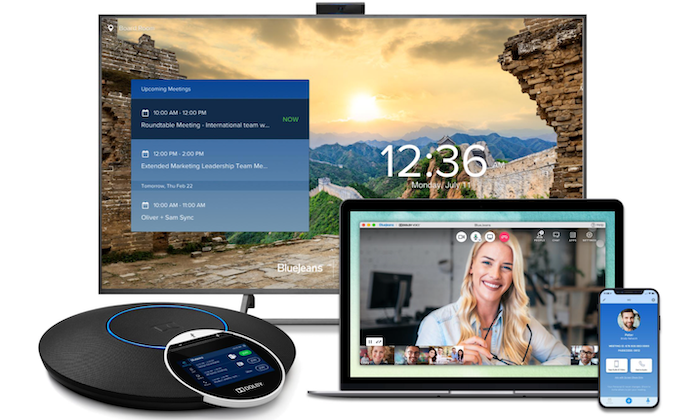
Disclosure: This content is reader-supported, which means if you click on some of our links that we may earn a commission.
Video conferencing software has exploded in popularity over the last year. With people working from home and remote work becoming the new normal, businesses rely on video conferencing services to communicate.
But not all video conferencing software is the same.
The tools you use to video chat with your friends and family across the across aren’t necessarily the best business communication options.
Which video conferencing software is the best for you? I’ll break down my top picks in greater detail below.
The Top 6 Options For Video Conferencing Software
How to Choose the Best Video Conferencing For You
As you’re shopping around and evaluating different options, there are certain criteria that must be taken into consideration. Keep these factors in mind to ease the buying process and narrow down the best video conferencing software for your business.
Call Size
The first thing you need to consider is the call restriction limitations. How many people can be part of the video conference?
Entry-level plans might restrict you to 25 or 50 callers while the highest tiers can be 10,000+.
If you’re running a small business or just need to occasionally meet with a small team, you probably won’t run into problems with restrictions. But for those of you who plan to give presentations to your entire enterprise-size organization, a large call size capability will be a top priority.
Simultaneous Video Streams
Even if you get a plan with a large call size, it doesn’t mean that everyone on the call will be able to stream their webcam simultaneously.
Let’s say you have 500 people attending a video conference; there won’t be 500 videos on the screen. You might be limited to just 10 or 20 streamers. The rest will be view-only.
Video Quality
There’s nothing worse than being on a video conference with a poor stream. It can really distract from the purpose of the conference. Everyone is worried about disconnecting and then reconnecting, hoping that fixes the issue, which wastes valuable time.
Each participant’s individual Internet connection will obviously impact the quality as well. However, some software is definitely better than others in this category.
The best way to determine the video quality of the software is by experimenting with free trials and reading reviews from current customers.
Team Collaboration Features
If you’re using video conferencing software for work, it’s useful to have an all-in-one collaboration solution.
I tend to look for features like file sharing, cloud storage, screen sharing, presentation mode, and integrated live chat. You should also look for features that integrate with tools you’re already using for CRM, site analytics, or whatever else your team is working on.
Now everyone can collaborate from a single platform, instead of bouncing back and forth between different software while on a video conference call.
Industry and Specific Use Cases
What exactly do you need video conferencing software for?
There are plenty of general-purpose solutions out there. But in some instances, certain software is geared towards purposes like remote work or international calls. There are even industry-specific tools for healthcare or education.
So if you fall into one of those categories, make sure you choose a software that accommodates your unique needs.
The Different Types of Video Conferencing Software
As previously mentioned, not all video conferencing software is the same. I’ll quickly name and explain the most popular options, so you have a better understanding of what to expect as you’re shopping around.
Cloud Video Conferencing Software
Cloud software or browser-based video conferencing software is extremely flexible. Participants can join a call from anywhere, simply by logging in through a web browser.
This software is supported by open WebRTC (real-time communications) standards.
If you’re going to have conference calls with participants outside of your organization, then you’ll definitely want a cloud solution. Then you can invite people to join with a URL link, and they won’t have to download any software.
For example, let’s say you have a sales team that uses video conferencing to communicate with prospects. Forcing those potential customers to download software would add friction and confusion to the sales process.
Desktop Applications
Desktop apps are commonly used for in-house video conferencing. The best video conferencing software will support all major operating systems.
Call quality and features are usually enhanced with a desktop app. For example, you might not be able to share your screen on a cloud version of a software, but you’d access that feature by downloading the desktop app.
Mobile Video Conferencing
Mobile video conferencing is crucial for people who need to join calls on the go. Busy professionals can’t always be tied to a desktop or laptop computer. But this type of software allows people to participate from smartphones and tablets.
If you’re using cloud software, you can usually join from a web browser on your mobile device. However, the experience is definitely enhanced by downloading the mobile application from your video conferencing provider.
Nearly all of the best video conferencing software on the market today will have some mobile conferencing features.
Meeting Room Systems
Some businesses require a complete meeting room system for video conferences. These solutions require additional hardware, like external cameras, microphones, speakers, and more.
A meeting room system is typically designed for physical conference rooms. If you’re having a video conference call in an executive board room with a dozen people present, a laptop at the end of the table isn’t going to cut it.
These really aren’t necessary for home offices or remote work. They’re designed for large spaces and large groups in a single location.
#1 – BlueJeans — Best For Remote Work
BlueJeans has a wide range of video conferencing options for businesses of all sizes. It’s trusted by global brands like ADP, Facebook, Zillow, Intuit, and National Geographic.
For small and large businesses alike, BlueJeans can help your organization and employees communicate by providing them with the right tools for remote work.

Depending on your needs, there are actually four different BlueJeans video conferencing products for you to choose from. Here’s a quick explanation of each one:
- BlueJeans Meetings — Video, audio, and web conferences from any device
- BlueJeans Rooms — Single-touch audio and video conference rooms
- BlueJeans Events — Host and stream interactive events for large audiences
- BlueJeans Gateway — Access Microsoft Teams calls from any meeting room system
BlueJeans was recently acquired by Verizon, so the video call quality is exceptional. You’ll also benefit from features like enterprise-grade security, meeting transcriptions, automated alerts, meeting management tools, analytics, and more.
Pricing starts at $9.99 per host per month.
The entry-level plan comes with unlimited 1:1 meetings, unlimited group meetings, unlimited meeting lengths, and five hours of recording. You can host video conferences with up to 50 participants on this plan as well.
Try it free for 7 days.
#2 – Cisco Webex Review — Best For Healthcare
Cisco has been an industry leader in the telecommunications space for 35+ years. So it should come as no surprise to see Cisco Webex rank so high this list.
In addition to basic video conferencing, Cisco has tools for contact centers, online meetings, cloud calling, online training, team collaboration, and more. But what really stands out is the industry-specific solutions offered from Webex, including video conferencing for healthcare.

As more and more medical practices make the transition to telehealth, Cisco Webex has been growing in popularity. It’s a top solution for practices that need to meet with patients online, make administrative calls, collaborate with care teams, and healthcare IT teams.
From virtual consultations to training and security, Webex has everything healthcare organizations need for video conferencing.
Here are some of the highlights of using Cisco Webex:
- End-to-end security with strong encryption
- High-quality video and audio calling
- Virtual training capabilities with recording and on-demand viewing
- Share your entire screen or just share a single app or document
- AI powered web assistant
- Integrations with tools like Slack, G Suite, Salesforce, and more
- Compatible on web, desktop, mobile, and video systems
For anyone that prioritizes quality and security, Cisco Webex will be a top choice for you to consider.
Plans start at $13.50 per host per month. Sign up for free to try it out; no credit card required.
#3 – Lifesize Review — The Best Zoom Alternative
Zoom has quickly become a household name over the past year or so. But it’s not for everyone, and lots of businesses are looking elsewhere for a video conferencing solution.
If you’re searching for a similar setup and feature list, Lifesize will be your best option.

Lifesize is a cloud video conferencing solution and team collaboration platform that’s compatible with any device. You can use the software to meet with co-workers, clients, employees, and anyone else, from anywhere.
Let’s take a closer look at some of the benefits and highlights of Lifesize:
- Ultra-high definition and 4k screen sharing
- Unlimited guest invitations to meetings
- Large meetings with up to 500 participants
- Broadcast live events with up to 10,000 viewers
- Manage users and room settings from a web-based admin console
- High encryption standards for robust security
- Interoperability with Slack, Microsoft Teams, Skype, and more
For those of you who need a complete meeting room system, Lifesize has all-in-one conferencing solutions with hardware as well.
Lifesize is free for up to 10 participants with unlimited meetings. The entry-level plan starts at $12.50 per host per month. This plan comes with SSO support and allows you to host meetings with up to 100 participants.
#4 – Whereby Review — The Best Simple Video Conferencing Software
Whereby is arguably the simplest video conferencing solution on the market today. There’s no app installation required. Just choose a personalized meeting URL, and participants can access the same link every time.
The software was actually built in Norway, and it’s a popular choice for Europeans. So it’s GDPR compliant and follows some of the strictest data protection and privacy laws globally.

Here’s a quick overview of the features and benefits you’ll get by using Whereby for video conferencing:
- Live chat and reactions during video calls without interrupting the speaker
- Rooms are locked by default, so admins can choose who to let in
- Fit up to 50 participants in a room at the same time
- Host has control to mute members and end the meeting for everyone
- Participants can open other tabs and explore websites during a meeting
- Add company branding and logos to your meeting rooms
- Integrations with Google Calendar and Outlook Calendar
- Record meetings that you can download and share
- YouTube integration for watching videos during a meeting
- Screen sharing, Google Docs integration, and mobile support
Again, even with all of these great features, Whereby is as simple as it gets. It’s easy for anyone to use and figure out, regardless of their technical skill level.
There’s a free forever plan for personal use that can host small meetings with up to four participants. Paid plans start at just $9.99 per month.
#5 – RingCentral Review — Best All-in-One Communication Suite
If your business needs more than just video conferencing, look no further than RingCentral. Unlike other software options that accommodate personal use, RingCentral is built specifically for businesses.
They offer an all-in-one communication suite for integrated video meetings, phone calls, team messaging, file sharing, and task management.

The software is trusted by 400,000+ organizations across the globe, making it one of the most popular video conferencing solutions on the market today.
Let’s take a closer look at some of the features, benefits, and highlights of RingCentral:
- Enterprise-grade security and a 99.999% uptime SLA
- Easy to set up, deploy, add new users, and manage teams
- Works from any device
- Solutions for small businesses, enterprises, and everything in between
- Tools for remote work and remote customer service
- Cloud phone systems and contact centers
- Solutions for managed service providers
RingCentral even has industry-specific solutions in categories like education, healthcare, retail, financial services, high tech, contact tracing, and more.
Plans start at $19.99 per user per month. You can try RingCentral for free with a 15-day trial.
#6 – GlobalMeet by PGI Review — Best For International Video Conferencing
GlobalMeet is another popular business communications platform. As the name implies, the software is built to accommodate international calls.
They have 160+ points of presence in over 60 different countries. This allows for exceptional call quality, even with participants streaming video calls from different continents.

Here are some other top reasons why I like and recommend GlobalMeet:
- They offer hardware solutions for complete video room integrations
- Join calls on the go through the mobile app
- Record your meetings and play them any time with cloud recording capability
- Single-click to join video calls from an intuitive user interface
- High definition video with simultaneous screen sharing functionality
- 24/7 customer support via live chat, phone, and email in 12 languages
For organizations with an international presence, whether it be internally or with clients, GlobalMeet by PGI is the clear winner.
There’s a free plan for basic use, and paid plans start at $12 per user per month.
Summary
What’s the best video conferencing software?
With so many options to consider, naming just one as my top pick isn’t very practical. It all depends on what you’re looking for.
Regardless of your business size, industry, or video conferencing needs, you can find what you’re looking for using my methodology and recommendations listed in this guide.
Youtobe
No comments:
Post a Comment